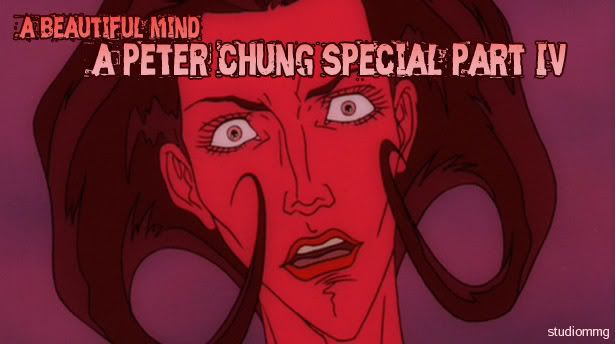 This is the fourth and final feature on the amazingly creative Peter Chung. It was a fairly long and laborious ride, but overall his take on the creative process certainly opened my eyes. (More so than any Creative Director guy actually) If you are sick of hearing about this guy and how he’s really just an overrated fop, then I say to you "
This is the fourth and final feature on the amazingly creative Peter Chung. It was a fairly long and laborious ride, but overall his take on the creative process certainly opened my eyes. (More so than any Creative Director guy actually) If you are sick of hearing about this guy and how he’s really just an overrated fop, then I say to you "You know what’s funny? A few weeks after writing the Peter Chung Specials, I actually found the Aeon Flux first season, 3-Disc DVD set! I literally froze for a few moments before I realized that this was real. Without hesitation, I bought the damn thing and whaddaya know, they don’t make shows like this anymore! It’s not Japanese anime, nor was it run-on-the-mill Saturday morning American animation, it was like that time I watched the original Heavy Metal animation. It was surreal, addictive and oftentimes over-the-top. Definitely an acquired taste.
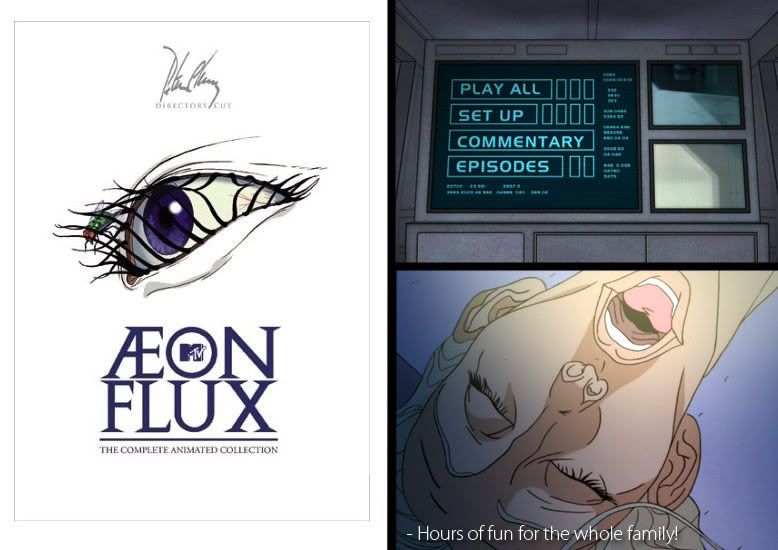 It sure beats the hell out of watching overpriced, uninspiring oddities like the Robotech: Shadow Chronicles Special Edition DVD set.
It sure beats the hell out of watching overpriced, uninspiring oddities like the Robotech: Shadow Chronicles Special Edition DVD set.One thing that really attracted me was Mr. Chung’s style. It’s hard to say who exactly are his influences, so lets just say that his style is “inspired”. (Where “Inspired” doesn’t necessarily mean bad copy of the original source) It’s different, and I like it. A lot. Here are some excerpts from various interviews around the net…
Morphizm: What would you say that style is? How did you arrive at it?
Peter Chung:
Well, I don't know if it's right for an artist or designer to comment on how his own style came about. I know that sounds like a copout, but in a way the ideal is to try not to achieve a style but rather approach everything in a way that feels most natural to yourself, and that ends up being your style. You end up with these labels after the fact. It's a very complex process.
My thoughts:
Peter has a thing about labels, which you will soon find out.
Peter Chung:
Yes, you obviously pick up points from artists whose work you like, but that's just half of it. The other half of it is avoiding formulas used by designs you don't like. And, in a way, that's a lot harder to do that it sounds. It's very hard not to show signs of influence. It's why so many animators draw in such similar styles. It's even harder to shed yourself of those influences.
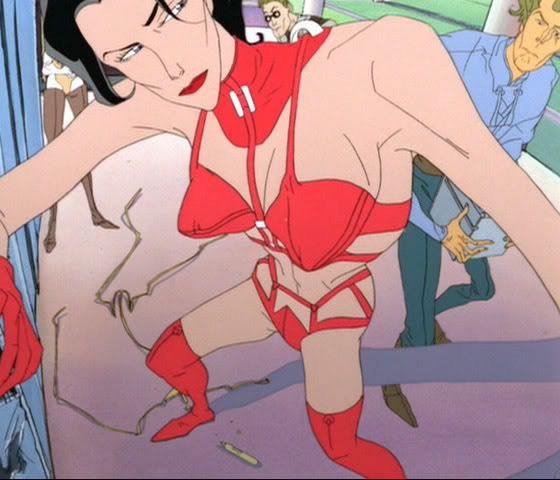 Morphizm: (A different interviewer)
Morphizm: (A different interviewer)It also helps to know what an artist has done throughout his career, not just the stuff he or she did that was popular. The idea that you were partially behind the design of Rugrats seems to irrevocably change the idea of a "Peter Chung" aesthetic, one that seems mostly informed by Aeon Flux. Just as knowing, as many don't, that much of popular Japanese animation was informed by Walt Disney.
Peter Chung:
Right, through Osamu Tezuka. I would say that right now a lot of Japanese animation has become very incestouos and inbred. It's become so much like animation of animation. Know what I'm saying?
Morphizm: A copy of a copy.
Peter Chung:
Right, in the same way some Cartoon Network shows, like Powerpuff Girls and Dexter's Laboratory, take that retro Hanna-Barbera style to the extent that it looks like animation made by people who spent their childhoods watching animation.
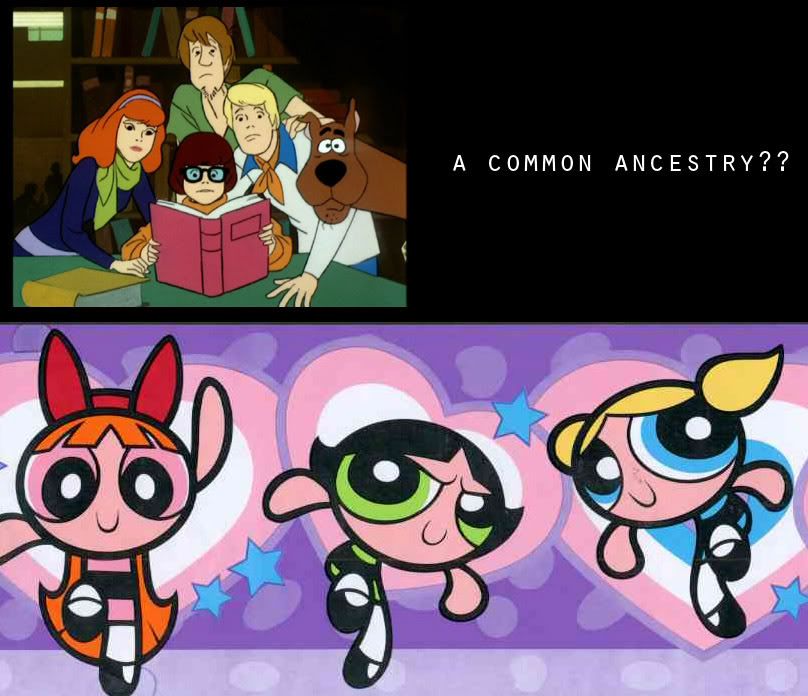 My thoughts:
My thoughts:Cool. I didn’t know about that! Well, some of it at least. It seems like I’m the kind of guy that has to have every aspect explained to him despite knowing that stuff already. I’m hard headed that way.
In any case, I will digress and point out that a lot of artists nowadays, especially those involved in the comics industry, have shown an increasingly manga-like influence. The Japanese manga-style has certainly become the style-du-jour for many young and impressionable talents. Even the animated stuff we see on TV now has characters looking more and more like anime hybrids.
With such a strong Japanese influence pervading the art community, I really do wonder what the future holds. Will young talents pursue their own style, or will there everything be soulless ‘manga-inspired’ or ‘manga-influenced’ work?
What am I saying?? I AM one of those young artists who have conformed to the conventions of manga visual aesthetic! But I guess it had more to do with me getting into this art biz by drawing anime fanart...
Seriously though, it takes real talents like Peter Chung and even highly acclaimed artist Ashley Wood to go beyond the blah-ness of the so-called stylistic-standards today and forge a style of their own. It’s a wonder the Aeon Flux aesthetic still seems so fresh even today despite having been made way back in the 1990’s.
The next question is an interesting one… About how artists lament about the “suits” and public perception of animation. (Reference taken from highly entertaining HBO’s series, Entourage)
 That damn Mouse has truly changed the way people view animation in the Western
That damn Mouse has truly changed the way people view animation in the Westernworld. American animation is still seen as something "for the kids", in the same way anime
is still considered "kiddie-nonsense" thanks to shows like "Pokemon".
DR: (A Different Interviewer)
Do the studios treat animation differently these days, or do they still have the attitude that it's something for kids?
Peter Chung:
It's strange in my case because I do a particular kind of animation, which is unusual, at least in this country [USA]. Yes, I find it very difficult.
I'll give you an example. I wanted to make Aeon Flux as an animated movie, which seemed to make the most sense because the idea behind the show, and the character originally, was to do things that you couldn't do in live action. For example, making her look the way she does and having the characters dress the way they are. It's something I wanted to do in animation, but I don't know if I'd do that in live action - you couldn't get away with it.
That was very frustrating for me, because they wanted to do an Aeon Flux movie, but they wanted to do it live action and change it to the point where it wasn't that close to the source material any more.
My thoughts:
Anyone know what happened to the Aeon Flux movie? Yeah, can you believe it? I talk about Peter Chung for four times in this stinkin’ blog and I still haven’t seen that movie-they-call-a-travesty. Oh well. I think the biggest travesty now is that when Aeon Flux is now associated with Charlize Theron. While not really a bad thing, it certainly made some people think that the original source material might’ve sucked as bad as the film. Aaaaaaugh!
Peter Chung:
In that sense, yes. I think that there's not really an understanding on the part of the studios on what the advantages are of using animation. All they tend to see are the disadvantages - like it takes a lot of time and maybe has less appeal to a wider audience - although it's strange that they'd make that last argument, because a lot of the top grossing films are animated movies.
DR:
It doesn't seem to be the rule when you take a live action movie and create an animated spin-off, though. Animatrix and Dark Fury both seemed to work well, and Genndy Tartakovsky's Star Wars: Clone Wars animated series was impressive.
My thoughts:
”Appeal to a wider audience” is a phrase that I have learned to love and loathe at the same time. When it’s applied, it can cause uproar among fans in video game franchises like Starwars Galaxies and about a dozen other niche gaming properties.
When done wrong, you’d have forgettable features like the uninspiring Shadow Chronicles, a direct continuation of the 1985 Robotech series or even the Aeon Flux film. (Sorry, I can't resist)
When done well, it can bring otherwise “closet” interests like Transformers, X-men and Spiderman to worldwide acclaim. What exactly makes something appeal to a wider audience? Watch this blog and find out!
Right now, lets find out what Peter Chung thinks about… dark dystopian futures!
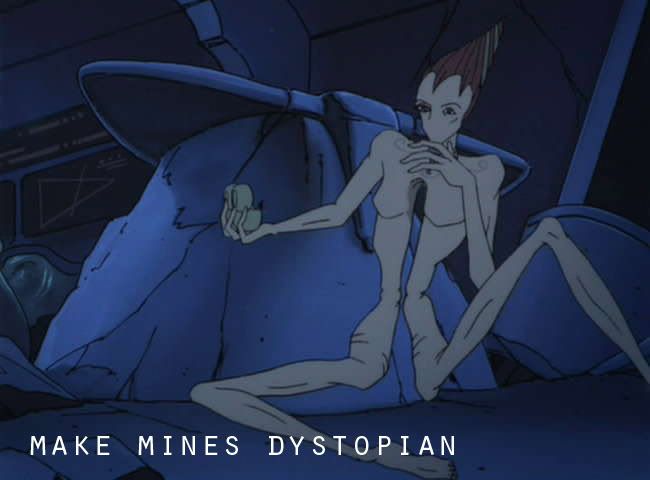 DR:
DR: In Aeon Flux (the series) we are offered yet another dark, miserable future for mankind. Why do you think it is that writers always seem to picture the future as a bleak place?
Peter Chung:
I've found this myself. I think that movies in general tend to try to convey as much as possible by amplifying contrast in every aspect. That's why movies are always filled with sex and violence - much more so than people's ordinary lives. I think it amps up the level of tension in a movie. I see it being done for that reason. You want to create an environment which is going to be more dramatically compelling.
Most of the movies that we see made about the past are also fraught with lots of violence. We see endless scenes of people fighting each other with swords [laughs]. It seems like most historical movies are focused on that stuff, whereas ordinary life wasn't like that - that was the exception.
My thoughts:
Escapism. Whatever it takes to make us forget about the insanity of daily life. Still, it doesn’t explain the success of game franchises like The Sims…
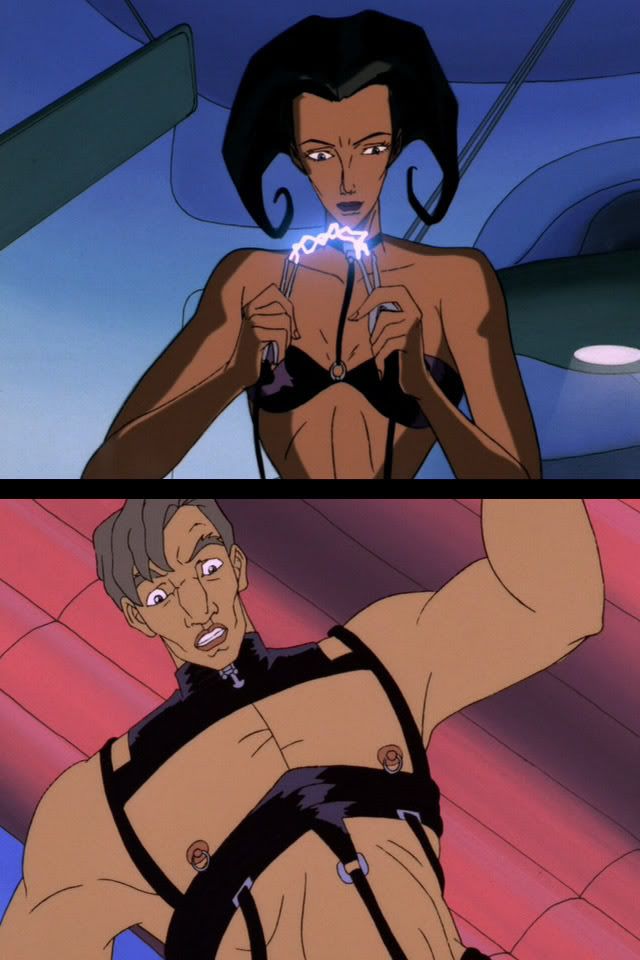 Yes! I think a Hollywood film with scenes like this would click with the moviegoing
Yes! I think a Hollywood film with scenes like this would click with the moviegoingpublic! (Seriously, I think it would - sorta like Ang Lee's Lust, Caution...)
Moving in a little more about Hollywood, and how the film adaptation of Aeon Flux has reaffirmed Mr. Chung’s stance on Hollywood and how iconic characters and images clash with reality.
DR:
Why do you think that Hollywood seems to have a habit of getting it wrong when transforming comic book characters into live action movies? And do you think that the live action Aeon Flux movie fell into a lot of those traps?
Peter Chung:
Yes, it definitely fell into a lot of those traps. I think they tend to take things too literally - which when you're doing something in comic book or animation, you are really working on a much more mythical level. And you can't help it because drawings are, in a sense, symbols.
The way superheroes characters are dressed, for example, has a lot to do with creating an iconographic image, but if you literally had somebody dress up like that it would look ridiculous.
The way around that is to create a whole world in which everything is portrayed in that iconic way. And the ones, I think, that fail are those that plop this iconic character in a very realistic, every day environment. And that's kinda goofy to me.
My thoughts:
I did hear from renowned comic-guy Scott McCloud lament at how the comic industry had to rely on the success of its Hollywood industry to achieve a wider acceptance and appeal. The comic medium, from the power of its narrative, to its iconographic images is both powerful and beautiful, and sadly under appreciated and even looked down upon to this day. Lets continue:
DR:
CGI is still not at a level where it's believable yet, but when it is do you think that this would help animated movies to be better accepted by the studios?
Peter Chung:
No, because it's not about realism for me. I think that the comics that are the least successful, for me anyway, are the ones that are painted and rendered and made to look like scenes that have practically been photographed. I find those the most distracting. The more you try to make them realistic, the more preposterous it becomes. Keeping the graphics very stark and iconic I think works a lot better.
Peter Chung:
If you compare Jack Kirby's superheroes to Alex Ross's... With Alex Ross I'm always aware of some model posing in his studio [laughs] wearing some goofy costume. Whereas, with the Jack Kirby drawing, the drawing is the character. It's not a drawing of a guy dressed up as a character, the drawing is the character. That's the strength of the medium.
If you look at a Pixar animated film the characters are what you see on the screen. What you see on the screen - it's not an actor playing the character - that's the character. That's the advantage of animation over live action.
My thoughts:
Ever since I’ve read that statement by Mr. Chung, I haven’t looked at Alex Ross’ covers the same again. Okay to be fair, Mr. Ross’ art looks amazing at times, the comics themselves are beautifully painted, but it’s those freakin’ covers that are makin’ me laugh.
We go now to what he thinks about Hollywood – and Mr. Chung’s article which was written way back in 1998 – and how you just can’t make a good comic book film.
Morphizm:
Has there been anything since that 1998 article was written that you felt worthy to add to the list?
Peter Chung:
Actually no. (Laughs). Not in the area of comics at least.
Morphizm:
What about Sin City?
Peter Chung:
Sin City was a faithful adapatation of a comic book, but whether or not it was a good film depends on how you liked the comic. But I think it did a lot of things that are necessary in the comic book, but not in the film. Like the voice-over narration, for example. Where the characters are constantly describing stuff you're actually seeing happen. Which became irritating after a while.
 "And then I looked at him, and he asked me what I thought about his
"And then I looked at him, and he asked me what I thought about hisplan to kill that yellow bastard. I nodded, trying to tell him to shut the hell up cuz'
the bastard just wouldn't stop talking"
Morphizm:
They were going for the film noir vibe.
Peter Chung:
That's another thing, which is kind of a pet peeve of mine. Like I was saying earlier, you don't set out to make something in a certain style, whether its film noir or whatever. When the original filmmakers were making film noir, they didn't know what film noir was. That was a term a French critic slapped on the films later on. Those artists were making films that were based on what they observed and the evnironments they lived in.
Morphizm:
But these things become part of the cultural grammar.
Peter Chung:
Right, they do. But you shouldn't set out to make things that way. Then it's no longer authentic.
My thoughts:
Again, Mr. Chung says that thing about the labels and stuff! I think its brilliant! Don’t approach your work saying “it’s going to be a Starwars / Battlestar Galactica-ripoff” or something. That’s probably why I love shows like “Firefly” – it doesn’t really go around saying “Hey! Look at me! I’m a grand space opera in the vein of Starwars and Star Trek!” (As the Robotech: Shadow Chronicles film has proven) It’s a cool show about “cowboys” in space. Try to classify that with your cultural grammar please. As Mr. Chung said earlier about his artistic style, you go make something that just comes natural. Whatever fits the story / narrative.
Now here’s the real interesting part of these interviews – it’s when Peter Chung talks about geek facts. It sorta made me rethink about the way I looked at certain science fiction franchises…
DR:
Stylistically there seems to be quite a lot of retro elements in the design of Aeon Flux. Trevor's lab has large levers with big yellow knobs on them that look like they belong in the '60s Batman TV show. Was that your intention from the start, to give the show a retro feel?
Peter Chung:
Well, I never really thought of Aeon Flux as being set in the future. It was more like an alternate present. I was really interested in talking about the world we live in. I made a deliberate decision not to say how many years in the future it was set.
I think when you set it in a specific time and place then it becomes less relevant. You can say: "It's their world, their time and their problem." Whereas I wanted to talk about our world and our problems.
My thoughts:
Really?? Hmm… Is that why the stories of Aeon Flux seemed… more involved that some stuff I’ve watched over the years? Very interesting.
Peter Chung:
Going back to the mythical level that we were discussing earlier, it's the structure of what's happening - the relationship between the characters and the ideas - not the specific date and location and so forth.
I think a lot of science fiction on film and TV falls into that trap of trying to treat their stories literally. Then you tend to get caught up in a lot of arcane trivia about that world and it seems that people tend to focus on those things. Like, where are the Romulan's from? Or the fact that the Romulans are more technically advanced than the Klingons - and things like that. And Trekkies are obsessed with things like that. And this is the point. All that stuff is fictional, it has nothing to do with anything. You get obsessed with these fictional details, which are really, ultimately, arbitrary.
My thoughts:
Whoa! Slow down there Peter! I think I get what you’re trying to say here! Crap… It sorta makes you laugh. Once upon a time I was totally involved in the 1985 animated series Robotech and I would see people try to explain the most insane things like how a weird flower is able to power spaceships and other high-tech stuff. Then these crazy debates would erupt, without ever reaching a conclusion. People lose focus on the story, the characters; the things that matter – people get too mixed up with what is essentially ‘fanwank’. (Discussed earlier in the blog many times)
Here’s another interview about the same topic:
Morphizm:
Do you think it was a mistake to set the film on a specific date in the future?
Peter Chung:
When you nail those things down, the film becomes locked in them and starts to lose its symbolic value. A lot of science-fiction films make the mistake of taking their premise literally rather than metaphorically. The thinking is that it will have more relevance if you nail it down, that it will become unambiguous. But I think the opposite effect is achieved. The more you're able to project your own world upon the work, the more power it has. Whereas if you nail down the time and place, the more you can say, "Oh, this is a story about their world that takes place in that time and that place. It has nothing to do with us."
My thoughts:
Yes, I guess a lot of us hate uncertainty; People hate ambiguity. But that is also why I stuck with shows like Robotech. Look at Starwars and Star Trek – literally every detail of their galaxy has been explained.
I love this comment "The more you're able to project your own world upon the work, the more power it has."
Remember this post about Half-Life? The world 'projected' events in newspapers, radios and posters. Environmental storytelling made the game and piecing the overall story arc together even more satisfying than having everything offered to you in some talky, overlong prologue.
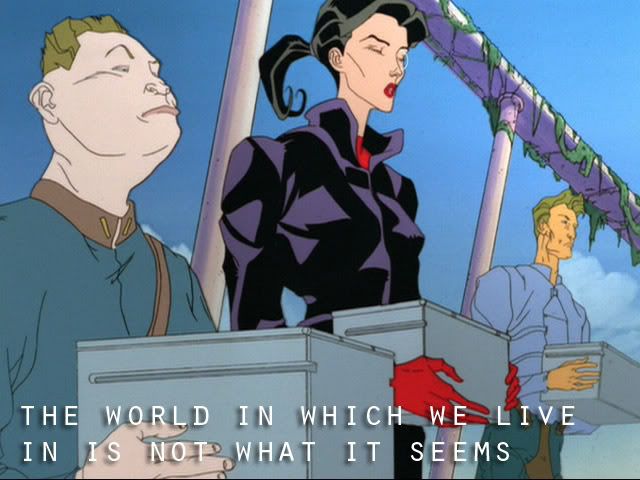 Morphizm:
Morphizm: How would you describe the world that this movie takes place in? As well as the animated version, if you find serious discrepancies.
Peter Chung:
The world that the movie takes place in is narrowly defined. The majority of the population has been wiped out and the only survivors of Earth are restricted behind this walled city ruled by Trevor, which was never the backstory of the animated series, where it was implied that there was a wider world existing beyond those boundaries. I'm not going to talk too much about the world of the movie, but I'd just expand on that idea that these stories are more meaningful the more you meet them with the language of metaphor.
My thoughts:
In a way, Robotech, being a much more niche franchise, greatly benefited from an almost complete lack of “Geek Fact Book” merchandising (compared to say, Starwars or Star Trek, which has “Geek Fact Books” up the wazoo).
Note: Geek Fact Books could be anything from Role-playing-game Sourcebooks, to Official Companion Guide Books, to various comic books and novels.
Over the years, Robotech fans had to come up with their own explanations for events that happened during the series’ 85-episode story arc, since many of the “official sources” always came up short, or were simply too inaccurate. It was only when the new Creative Director came in and presented his own interpretation as ‘fact’ did the show seem to lose its magic. The series’ creative power was taken away.
I guess what I’m trying to say is, Robotech should never really have taken the Starwars-approach. It relied on so many unexplained metaphors and events that it was best to leave it up to the audience’s imagination and interpretation. A different approach was required for the series… but that opportunity was sadly squandered over the years with retreads and reprints.
Behold, you have witnessed the (to loosely use that term again) power of a multi-layered narrative!
- Rambling Madman
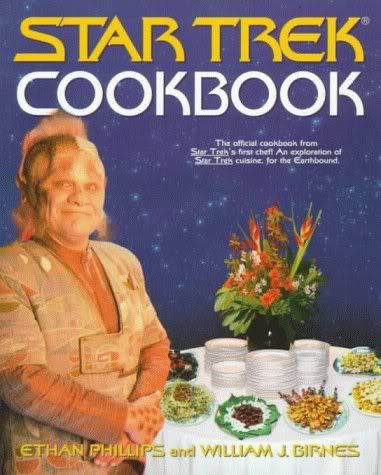 If your favorite science fiction/fantasy series ever plans
If your favorite science fiction/fantasy series ever planson making one of these to "enrich the universe", tell the
franchise/license owners to go f**k themselves.
The interviewer asked a follow-up question about the elements we just discussed... It seems that studio execs actually demanded Peter Chung to add these “geek facts” to his work. You know, arbitrary stuff like a definite timeline, a complete history of the Tirolian / Forerunner / Alien Overlord empire, all that s**t.
DR: Do you find that when you are selling an idea to a studio head, that those are the sorts of elements that they demand of you too?
Peter Chung:
Well... they do. And I think it's a big mistake. They think, for example, that an audience needs that in order to feel grounded. And I think that a lot of viewers maybe do need it, which is probably why a lot of people didn't understand Aeon Flux. But I think that the people that do appreciate it do so for the reason that it's not about creating some fictional world. It's really about projecting ideas that are taken from our world. It's really talking about life as we live it now, amplified.
My thoughts:
That is really, quite beautiful, Mr. Chung. I never really thought of it that way until now. The thing is, I myself like either approach to storytelling. Creating fictional worlds with complete history can be a good thing when done well. Look at works of the great fiction writers like Tolkien, or Prachett, or Herbert. To this day, their rich fictional worlds continue to offer the disillusioned masses a great way to escape this reality (A further study of this is required).
However, It’s good to see that Mr. Chung’s narrative approach reaffirms my affinity for the so-called multi-layered narrative.
So there you have it, my dear Void. I can’t say enough praises to this guy, so I won’t. I’m pretty sure there are other artists who are equally as compelling as our boy here, and I look forward to getting to know em’ better. But now, with all the Peter Chung madness behind me:
A Beautiful Mind: Peter Chung Special Part 1
A Beautiful Mind: Peter Chung Special Part 2
A Beautiful Mind: Peter Chung Special Part 3
A Beautiful Mind: Peter Chung Special Part 2
A Beautiful Mind: Peter Chung Special Part 3
I think I want to end this wonderful and enlightening series with a snap... I mean bang!
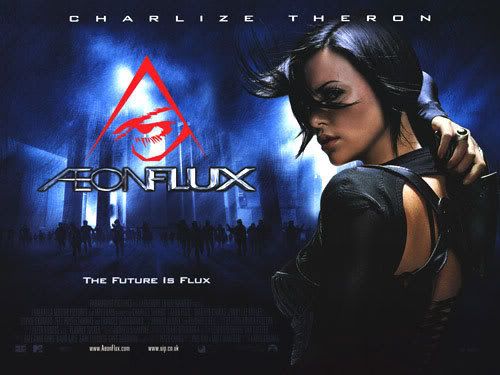

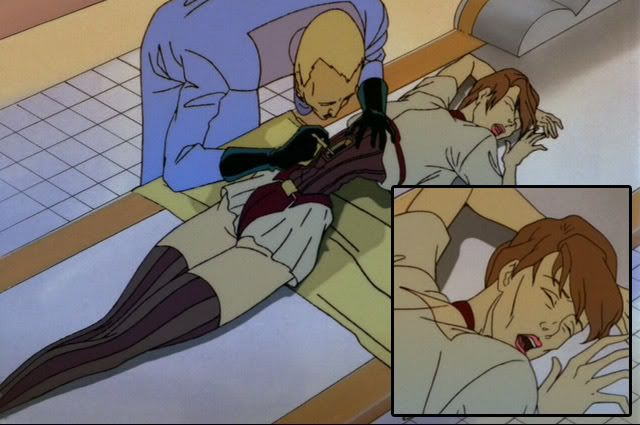

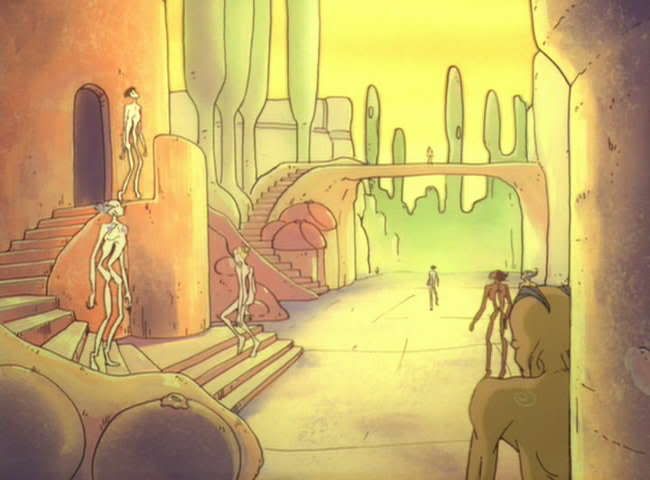
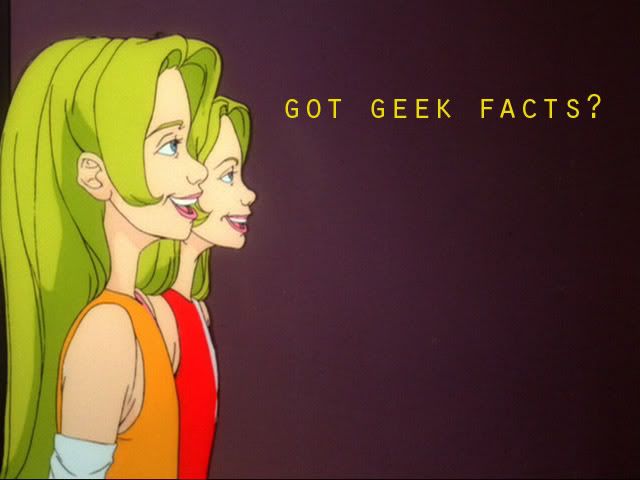






0 comments